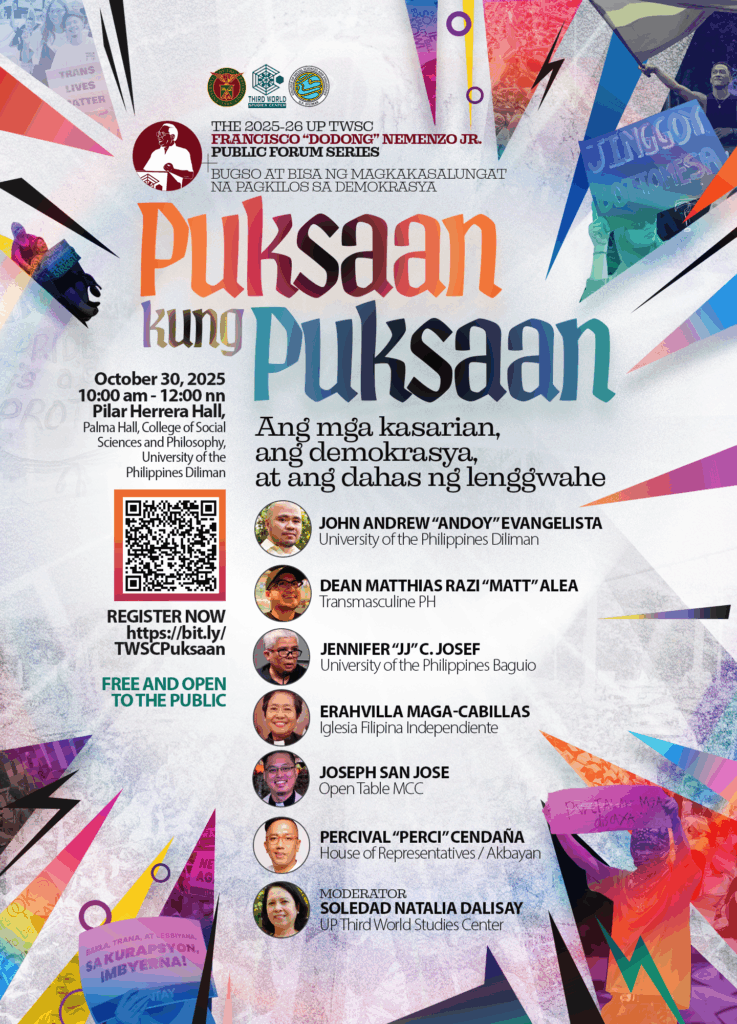The UP Third World Studies Center invites the public to 𝙋𝙪𝙠𝙨𝙖𝙖𝙣 𝙆𝙪𝙣𝙜 𝙋𝙪𝙠𝙨𝙖𝙖𝙣: 𝘼𝙣𝙜 𝙢𝙜𝙖 𝙆𝙖𝙨𝙖𝙧𝙞𝙖𝙣, 𝙖𝙣𝙜 𝘿𝙚𝙢𝙤𝙠𝙧𝙖𝙨𝙮𝙖, 𝙖𝙩 𝙖𝙣𝙜 𝘿𝙖𝙝𝙖𝙨 𝙣𝙜 𝙇𝙚𝙣𝙜𝙜𝙬𝙖𝙝𝙚, the first installment of the 𝟮𝟬𝟮𝟱-𝟮𝟲 𝗨𝗣 𝗧𝗪𝗦𝗖 𝗙𝗿𝗮𝗻𝗰𝗶𝘀𝗰𝗼 “𝗗𝗼𝗱𝗼𝗻𝗴” 𝗡𝗲𝗺𝗲𝗻𝘇𝗼 𝗝𝗿. 𝗣𝘂𝗯𝗹𝗶𝗰 𝗙𝗼𝗿𝘂𝗺 𝗦𝗲𝗿𝗶𝗲𝘀: 𝗕𝘂𝗴𝘀𝗼 𝗮𝘁 𝗕𝗶𝘀𝗮 𝗻𝗴 𝗠𝗮𝗴𝗸𝗮𝗸𝗮𝘀𝗮𝗹𝘂𝗻𝗴𝗮𝘁 𝗻𝗮 𝗣𝗮𝗴𝗸𝗶𝗹𝗼𝘀 𝘀𝗮 𝗗𝗲𝗺𝗼𝗸𝗿𝗮𝘀𝘆𝗮.
![]() 𝗗𝗔𝗧𝗘: October 30, 2025
𝗗𝗔𝗧𝗘: October 30, 2025
![]() 𝗧𝗜𝗠𝗘: 10:00 am to 12:00 noon
𝗧𝗜𝗠𝗘: 10:00 am to 12:00 noon
![]() 𝗩𝗘𝗡𝗨𝗘: Pilar Herrera Hall, Palma Hall, College of Social Sciences and Philosophy, University of the Philippines Diliman
𝗩𝗘𝗡𝗨𝗘: Pilar Herrera Hall, Palma Hall, College of Social Sciences and Philosophy, University of the Philippines Diliman
![]() 𝗥𝗘𝗚𝗜𝗦𝗧𝗘𝗥: https://bit.ly/TWSCPuksaan
𝗥𝗘𝗚𝗜𝗦𝗧𝗘𝗥: https://bit.ly/TWSCPuksaan
Amidst chants of “Zaldy, Zaldy Magnanakaw” and “DPWH, Kurap Kurap Kurap,” sexually explicit choruses implicating Jinggoy, Marcos and the Discayas were also heard and plastered all over the placards raised during the September 21, 2025, mobilizations. In an anti-corruption movement, what significance does outing a corrupt politician hold? When brewing action against state greed, why is rage propositioned in terms of sexual domination? Laughter is an immediate reaction, but it reveals to us a glossed over issue on how we use both gender and sex in democratic discourse.
Contradiction arises when we indirectly demean through the pronouncements, we deploy queer groups and victims of sexual violence with whom we share democratic spaces with. Creating such categories of un/acceptability limits the scope of our progressiveness. With LGBTQIA+ groups already under pressure from structural violence, linguistic and epistemic violence also create further cleavages from within.
Gendered language has been a major tool for political organization with the construction of “mothers” and “fathers” of a nation, the existence of “mother nature,” the assignment of countries as “she/her” damsels, and the usage of queer terms to shame and demonize people. Invisibility and restriction of the queer lead to suffering and termination, as exemplified in cases from the West. These hidden transgressions in LGBTQIA+ politics have shaken Philippine democracy at a level we have not fully articulated yet.
To discuss queerness is to reveal normativity entrenched in the heterosexual, it is to make visible the raptures that skew what is deemed to be straight. How do we even pursue progressive queer politics when queer individuals themselves are compelled to follow heterosexual norms? If democracy is claimed as the power of the people, where is power for those whose identities are used for humiliating the corrupt? Where is power for those who are victimized by those they consider allies?
The first installment of the UP TWSC 2025-26 Francisco “Dodong” Nemenzo Jr. Public Forum Series focuses on the idea of the queer—both as an identity marker and an analytical lens—in examining Philippine democratization today. We interrogate how imposed heteronormativity affects the political constructions of those within and outside the queer and how these can affect democratic deliberation and contestation. What challenges do we face with the rigidity of heteronormativity? In the debate between identity and difference, how can queer political liberation be realized? How do we engender genuine recognition, representation, and protection of the queer in democratization? What does queering Philippine democracy entail?
![]() Read more about the 2025-25 UP TWSC Francisco “Dodong” Nemenzo Jr. Public Forum here: https://www.facebook.com/share/p/16HRevt83h/
Read more about the 2025-25 UP TWSC Francisco “Dodong” Nemenzo Jr. Public Forum here: https://www.facebook.com/share/p/16HRevt83h/

